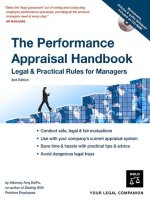your little legal companion, helpful advice for life's big events (2006)
Bạn đang xem bản rút gọn của tài liệu. Xem và tải ngay bản đầy đủ của tài liệu tại đây (946.17 KB, 224 trang )
Your Little
Legal Companion
First Edition MAY 2006
Book Design SUSAN PUTNEY
Proofreading JOE SADUSKY
Illustrations MICHAEL POWELL ()
Printing DELTA PRINTING SOLUTIONS, INC.
Your little legal companion : helpful advice for life’s big events / from the editors of Nolo.
p. cm.
ISBN 1-4133-0542-3
1. Law United States Outlines, syllabi, etc. 2. Law United States Popular works. 3.
Life skills United States Outlines, syllabi, etc. 4. Life skills United States Popular
works. I. Nolo (Firm)
KF387.L58 2006
646.7 dc22
2006043785
Copyright © 2006 by Nolo. All rights reserved. Printed in the USA.
No part of this publication may be reproduced, stored in a retrieval system, or
transmitted in any form or by any means, electronic, mechanical, photocopying,
recording, or otherwise without the prior written permission of the publisher and
the authors. Reproduction prohibitions do not apply to the forms contained in this
product when reproduced for personal use.
Quantity sales: For information on bulk purchases or corporate premium sales, please
contact the Special Sales department. For academic sales or textbook adoptions, ask
for Academic Sales, 800-955-4775. Nolo, 950 Parker St., Berkeley, CA 94710.
We believe accurate, plain-English legal information should help you solve many of
your own legal problems. But this text is not a substitute for personalized advice from
a knowledgeable lawyer. If you want the help of a trained professional—and we’ll
always point out situations in which we think that’s a good idea—consult an attorney
licensed to practice in your state.
Nolo would like to thank Guide Dogs for the Blind (www.guidedogs.com) for their
assistance in nding the ideal dog to grace our covers.
About the Authors
Every Nolo project is collaborative—but this one was truly
a group eort. All of Nolo’s legal editors wrote parts of
the book, and we had some fun doing it. But greatest
credit is due to Tamara Traeder, who came up with many
of the ideas for this book, put everything together, gave it
just the right tone, and did it cheerfully and well.
Dedication
For all the determined do-it-yourselfers who made
Nolo’s 35th anniversary possible.
Thank you!
T
hirty-ve years ago, a couple of Legal Aid attorneys
had a crazy idea (actually, they had several). Instead
of just turning away folks who weren’t poor enough to
qualify for free Legal Aid help or wealthy enough to
aord lawyers, they’d write down what those folks needed
to know, and publish it as a book. Being young, energetic
types, they did it—only to nd that no publisher would
touch it, for fear of making lawyers mad. No one wants to
make lawyers mad.
The early titles, like the Nolo books of today, were much
more than just do-it-yourself manuals; they were valuable
companions for people going through challenging,
stressful times. Still, a vocal minority within the legal
profession was dead set against this kind of publishing,
something they erroneously saw as a threat to consumers
or, even worse, their own livelihoods.
Thirty-ve years later, much has changed. Today there are
lots of books on legal topics like estate planning, divorce,
and bankruptcy. But Nolo is still the only publisher in
the country with a full-time sta of attorney-editors
who do nothing all day but write, edit, and update legal
information for people without law degrees.
The legal profession has changed, too, by becoming
more open and friendly in a variety of ways. Lawyers see
that Nolo books complement their services—and haven’t
wiped out the legal profession. Nolo itself has grown and
changed. We still publish the highest-quality resources for
people who are in the midst of a divorce or need to deal
with their landlord (or tenant), but we also publish books
and software that can help you le a patent, run your
business, or get what’s coming to you from the IRS.
I’m not a lawyer, but I’m surrounded by them every
day. It’s our dedicated Nolo lawyers (and all of the other
dedicated folks at Nolo who make the books and get
them to you) that make it possible for us to publish these
uniquely helpful books, books that provide a level of
information and reliability that no other consumer legal
publisher can match.
Nolo—Your Legal Companion … For over thirty-ve years.
David Rothenberg
President
Table of Contents
1 Going to College 1
2 Your First Job 5
3 Buying a Car 9
4 Renting an Apartment 13
5 Choosing a Roommate 17
6 Bringing That Adorable Puppy Home 21
7 Filing Your First Federal Tax Return 25
8 When You’ve Had a Car Accident 29
9 Quitting Your Job 33
10 Getting Fired 37
11 Starting a Business 41
12 Investing 45
13 Hiring an Employee 49
14 When Life Deals You a Physical Blow 53
15 Borrowing Money 57
16 Trouble With the Law 61
17 Changing Your Name 65
18 When You Start the House Search 69
19 Being a Good Neighbor 73
20 When You Elect to Be a Coach 77
21 When Your Identity Is Stolen 81
22 Getting Sued 85
23 Becoming a Landlord 89
24 Your First “Do-It-Yourself” Home
Improvement Project
93
25 Buying and Selling on eBay 97
26 Writing a Book 101
27 Surviving Bankruptcy 105
28 Moving in With Your Lover 109
29 Having a Brilliant Idea 113
30 Starting a Band 117
31 When You Become Engaged 121
32 Getting Married 125
33 You Want to Run a Marathon 129
34 Having a Child 133
35 Adopting a Child 137
36 When Your Child Starts Kindergarten 141
37 What You Should Know About Divorce 145
38 Going on Your Dream Trip 149
39 Getting Old 153
40 Surviving a Natural Disaster 157
41 Holding the Best Garage Sale 161
42 Going Back to School 165
43 Feel Good by Doing Some Good 169
44 When You Decide to Live in Another Country 173
45 Trac Tickets 177
46 Going to Small Claims Court 181
47 Planning Your Retirement 185
48 Retirement Plans 189
49 Becoming a Grandparent 193
50 Planning Your Estate 197
things you
should know
TEN
Let Freedom Ring
1
Going to College
Are you experiencing the joy (and terror) of
leaving home and going to school? You won’t
believe how much you’re going to learn, both
in class and out. Here are some things to keep
in mind as you get started.
2
1 Your Little Legal Companion
1
Act out. It’s tough to leave home, especially if you’re leaving a
nice one. That’s why, during your last year of high school, you
need to get really unpleasant—so everyone (including you) can
feel relieved, not sad, when you go.
2
What if I’m a geek? Your roommate is as worried about
meeting you as you are about him. Most of the time, your toys
will be as cool and up-to-date as his.
3
It’s never too late to grow up. You’ll be amazed at how
much your parents have matured in the short time between your
leaving for college and Thanksgiving.
4
No shame in getting help. If you nd that college is way
harder than high school, chances are your high school didn’t
prepare you for this level of work. Consider getting some tutoring.
5
They can’t do that—can they? Unfortunately, the Fourth
Amendment, which protects us against most unannounced
searches and seizures, hasn’t made it into your RA’s rule book.
An uninvited visit to check for beer in the fridge is probably okay.
6
You’ll nd your tribe. Science majors often become clearer
thinkers than English majors. However, English majors may catch
up when they inevitably enter law school (what else can they
do?). Where do you t?
3
7
The credit wave. You’ll be bombarded with credit card oers.
Don’t fall for them—it’s really easy to get out of control. (You may
already be out of control in other ways, but we won’t address
that here.)
8
You really are a grownup. Most colleges won’t discuss your
grades or your health with your parents. That could be a blessing,
or it could be a problem. Either way, you are en route to being
on your own.
9
Make connections. A personal relationship with a teacher
who will write you a thoughtful letter of recommendation is
worth at least two-tenths of a grade point.
10
Now for the important stu. You can date your roommate’s
steady, skip every class but the nal, and borrow every book—
but never, ever, wash your darks with your lights.
Going to College 1
4
1 Your Little Legal Companion
Don’t waste time in college taking staid courses like
history and math when you have these classes available:
“Philosophy and Star Trek” at Georgetown University.
“The Art of Sin and the Sin of Art” at Rhode Island
School of Design (the catalog promises that you’ll
“lust with the saints and burn with the sinners”).
“Daytime Serials: Family and Social Roles” at the
University of Wisconsin.
“From Pot to Pills: Exploring the World of
Recreational Drugs,” oered at the University of
California, Santa Barbara.
things you
should know
TEN
Welcome to 9-5
2
Your First Job
Whether your rst spoken words on the job are
“Do you want fries with that?” or “I represent
the plainti,” there are a few things you should
know before your rst work experience begins.
2 Your Little Legal Companion
6
1
Don’t lie to get a job. If you can’t do the work, both you and
your boss will be unhappy. And plenty of companies will re you
for lying on your application or resume.
2
Bring your ID. Your new employer has to verify that you’re
legally eligible to work in the U.S., which means you’ll need to
bring a passport, citizenship or naturalization certicate, green
card, or some combination of other documents proving your
identity and work status.
3
Don’t expect free health insurance. Employers aren’t
required to provide it. Fewer than two-thirds of private employers
make health insurance available, and most of them require
employees to foot part of the bill.
4
No one owes you paid vacation, holidays, or sick time.
No law requires companies to oer these benets, and some
of them don’t. Those that do are free to impose certain eligibil
-
ity rules—for example, you can’t take any vacation until you’ve
worked there for six months.
5
Get ready to sign on the dotted line. Many companies get
the work relationship o to a warm and fuzzy start by asking new
employees to sign an “at-will agreement,” stating that they can be
red at any time, for any legal reason. (In case you’re planning to
protest, they can also re you for refusing to sign the form.)
7
6
Stand up for yourself. Many new employees—particularly
teenagers working in retail and food service jobs—are mistreated
by supervisors who assume that they don’t know their rights. If
you are sexually harassed, forced to work o the clock, or exposed
to safety hazards, speak up.
7
Make yourself useful. Take on as many new responsibilities
as you can, and try to work for dierent supervisors. Not only will
you quickly learn what you are good at, you’ll also create allies
and make yourself more valuable to the company—the best job
insurance around.
8
Don’t be a know-it-all. One of the biggest complaints
employers have about hiring recent college graduates is that they
have an inated sense of themselves.
9
Try to t in. Let your work—not the way you dress or express
yourself—stand out. There will be plenty of time for personal
fashion statements when you own your own company.
10
It’s all about who you know. Make connections with your
coworkers and supervisors, and stay in touch with them even if
you leave this job. The best job opportunities come from personal
contacts, not from the want ads.
Your First Job 2
2 Your Little Legal Companion
8
(answers: 1 is b, 2 is c, 3 is d, 4 is a.)
Match the Celebrity to His or Her First Job
(1) Stephen King (a) Recalibrated car
odometers
(2) Demi Moore (b) Worked as a school
janitor
(3) Christopher Walken (c) Worked for a debt
collection agency
(4) Jay Leno (d) Photographed naked
for a calendar
things you
should know
TEN
Your Very Own Wheels
3
Buying a Car
Shopping for a new ride is a whole lot
dierent from what it used to be. As a buyer,
you have more options and much greater
access to information.
3 Your Little Legal Companion
10
1
Surf to ride. Use websites such as kbb.com (Kelly Blue Book),
edmunds.com, and nadaguides.com (National Auto Dealer
Association) to check out makes, models, gas mileage, optional
features, and colors. Investigate nancing sources, evaluate your
warranty options, and get an insurance quote—all before you
step out the door.
2
It adds up. Don’t forget sales tax, typical service costs for your
model, and ongoing registration and insurance costs when
guring out what you can aord.
3
History matters. If you’ve found the right used car, buy a
vehicle history report from carfax.com or autocheck.com to alert
you to inspections, repairs, accidents, oods, possible odometer
rollbacks, and other need-to-know events in the car’s history.
You’ll need the vehicle identication number (VIN) to do so.
4
Keep quiet and stay rm. Don’t let the seller know how much
you have to spend, the details of your nancing, or how badly you
need a new car. You know what you want, and how much you’ll
pay. Stick with your plan. Be ready to walk away.
5
Hate negotiation? Consider buying through membership
clubs such as AAA or Costco, or at used car “superstores.” You can
also hire an auto broker to do the negotiating for you. Ask around.
11
6
Be safe. If you’re looking at cars listed in the classieds or on the
Internet, don’t go alone to see a car or get in one, and meet in a
public, well-lit place.
7
Should you buy a warranty? Buying an extended warranty
for a new or used car sounds great, but it could be disastrous if the
warranty company goes belly-up. Research the warranty company
at bbb.org (Better Business Bureau) before signing the contract.
8
Don’t sign blindly. Don’t feel pressured to sign any contract
right away. Take the documents home and read them carefully.
If you’re not comfortable, have someone else read them, too.
9
Buying used? Used car dealers generally must display a Buyer’s
Guide on the car. Any dierences you negotiate with the seller
must be reected on the Buyer’s Guide—it decides future
disagreements with the seller, even if you negotiated something
else. If the “As-Is” box is checked, future repairs are up to you.
10
Keep it in the family? Before buying a car from a friend or
relative, consider the eect on your relationship if the car dies
and the seller chooses not to take responsibility.
Buying a Car 3
3 Your Little Legal Companion
12
Did you hear that?
Want to know what that noise is coming from under
the hood of your car or the back wheel? NPR’s Click
and Clack can help. Their online Car Talk Car Noise
Emporium has 30 dierent car noises—from “vubb,
vubububub, vubb, vubububub” to “who, whu, wuuu,
wuuu.” Simply click on the part of the car where you hear
the noise, nd the sound you’re hearing, and read the
ocial diagnosis.
A vote of condence
40% of Americans say that used-car salesmen are
generally more ethical than members of Congress.
things you
should know
TEN
Home Sweet Home
4
Renting an Apartment
Renting your home is an odd mix of personal
and business considerations—personal for you
and business for the landlord. Before choosing
a place and signing a lease, you should know
some of what your landlord knows.
4 Your Little Legal Companion
14
1
New paint is not a constitutional right. Landlords don’t
have to repaint before you move in (except in New York City, and
there it’s required only every three years).
2
Everybody’s memory fades, even yours. Get your rental
deal in writing, including the rent, deposits, and other key terms
of the deal. If the landlord agreed to fumigate the closet, put it in
the lease.
3
“But I’m sure you said . . . .” If you don’t put your agreement
in writing, but agree orally, you’re still bound to the deal for up to
one year. It’s just going to be harder to convince someone—like a
judge or jury—that your version is the true one.
4
Think again about those tap dancing lessons. One man’s
ceiling is another man’s oor. If you’re an inconsiderate neighbor,
your landlord has legal grounds to kick you out.
5
Don’t end up paying for damage that was already
there. Walk through the rental with the landlord, a clipboard, and
a digital camera that will date-stamp its pictures and document
the condition of the place. Ask the landlord to sign o on your
notes (if he won’t, at least you have pictures).
6
Hospitality is golden—but not to your landlord. A long-
term guest looks like an unauthorized occupant to a landlord—
and it’s grounds for terminating your tenancy. When your guest
15
starts receiving mail at your place, it’s time to notify the landlord
and ask to add your new roomie to the lease.
7
Taste does not matter. No matter how much you hate your
heliotrope bedroom, never repaint without the landlord’s consent.
You could end up paying a painter to reapply that lovely hue.
8
Hold your re. Don’t withhold the rent when your landlord
refuses to make repairs unless you’re sure your state allows it and
you’re doing it for a big-deal problem.
9
Get renters’ insurance. Your landlord’s property insurance
won’t cover your belongings if they’re lost in a re or burglary, or
damaged by that overowing bathtub upstairs.
10
When you must break a lease. In most states you’re not
automatically responsible for the remaining rent under the lease.
The landlord has to take reasonable steps to rerent and credit what
you owe with the new tenant’s rent. This also means that he can’t
just pocket the entire security deposit as a penalty for leaving early.
Renting an Apartment 4









